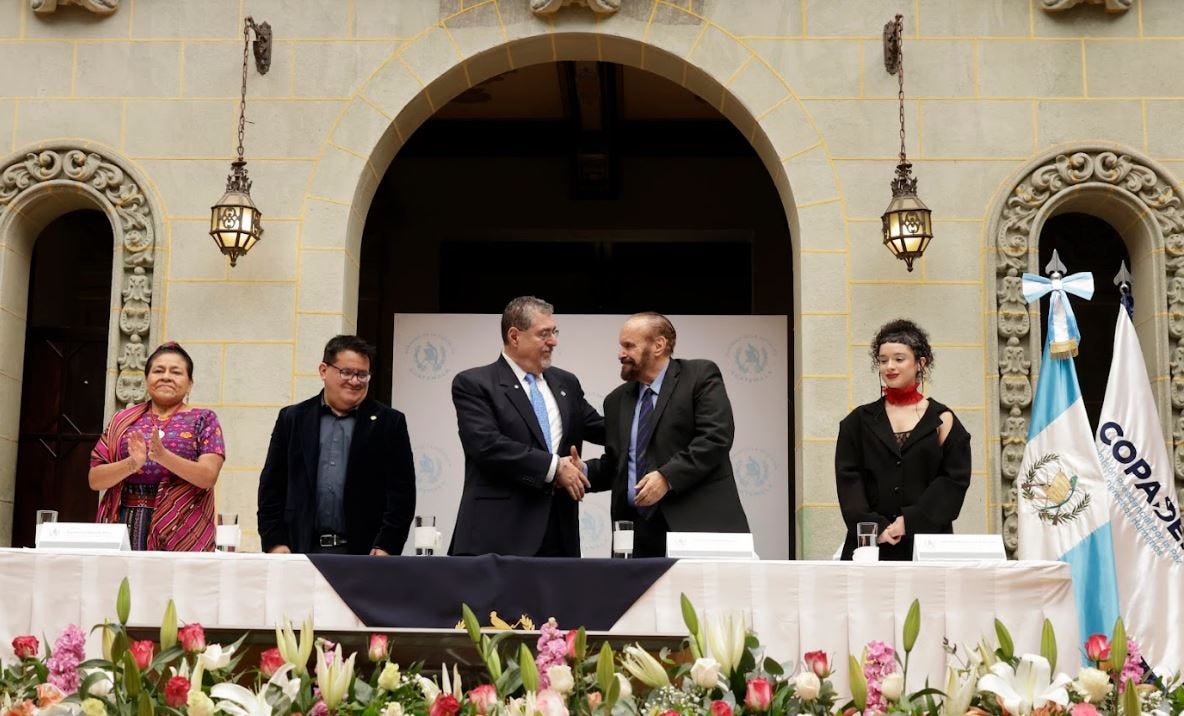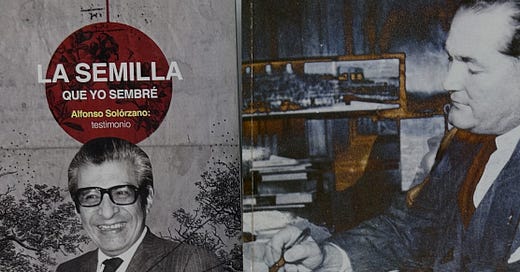The Other Disappearance of Alaíde Foppa
Exploring the strange disappearance of an intimate ordeal by the famous poet from the official record of her partners.
On December 3rd 2024, President Bernardo Arévalo paid homage to poet Alaíde Foppa in the National Palace and extended the official request for pardon for her forced disappearance in 1980. The official homage was long due. María Alaíde Foppa Falla was an accomplished poet, journalist, feminist, and academic. She also served as a member of the Press Office during the presidency of Juan José Arévalo, Bernardo Arévalo’s father. Her life was marked by brilliance, but also by tragedy: she was forcibly disappeared during one of the worst years of the armed conflict, a loss that still haunts Guatemalan intellectual circles. However, I would like to bring attention to another instance in which Alaíde has somewhat been partially disappeared: that of the official memories of her partners.
Foppa was loyal to President Arévalo to a fault. Her connection to the Arévalo family was very close. In 1945, she had a son with President Arévalo, a fact shrouded in secrecy for decades. Their child, Julio, was born out of wedlock while Arévalo was still married to Elisa Martínez, his first wife. Julio, who carries the surname Solórzano after his stepfather, is perhaps President Bernardo Arévalo's most famous older half-brother. Bernardo and Julio were both at the December homage, but to the best of my knowledge there was no mention of their odd family connection.
Alaíde Foppa’s personal story reveals the complex web of relationships at play in Guatemala’s political history. Born in Barcelona, raised in Buenos Aires, and educated in Europe, she was an impressive woman of many talents. She was a prominent intellectual, a feminist, a poet. However, her career as a journalist was interrupted by motherhood. After becoming pregnant during the first months of 1945, she moved to Mexico, where she married Alfonso Solórzano, a co-founder of Guatemala's Communist Party (PGT). Like the title of that famous Phillip Roth's novel, she married a communist. Together, they had children, and their entire family became entangled in Guatemala’s political struggles.
During the Revolutionary governments (1944-1954), Alfonso Solórzano was appointed to consular positions in Cuba and Paris. Alaíde would dedicate herself to raising their children, writing poetry and teaching at Universidad Nacional Autónoma de México (UNAM). Decades later, three of his children (Mario, Juan Pablo, and Silvia) joined the self-named Guerrilla Army of the Poor (EGP), that violent cult-like organization.
Understanding the interconnected histories of the Arévalo and Foppa families is key to grasping the broader political landscape of Guatemala. The Arévalos are the only family to have produced both a father and a son as presidents: Juan José and Bernardo, respectively. Bernardo is also a relative to president Ramiro de León Carpio, on his mother's side of the family.
The Solórzano-Foppas, meanwhile, have also maintained deep ties to Guatemala’s politics for generations. Alfonso's brothers were: Carlos Solórzano, an accomplished playwright, and Valentín Solórzano, who served as Minister of Economy under President Romeo Lucas García 1978-1982. (Ironically, Valentín’s nephews were fighting against the very government in which their uncle served as a high-ranking official.) On her mother’s side, Alaíde Foppa was related to, among others, the priest Ricardo Falla, a key figure in the Quiche, as well as to Alejandro Giammattei Falla, who would serve as President 2020-2024. More recently, Alaíde’s descendants continue to be active electorally. For example, her grandson, Juan Francisco Solórzano Foppa, served as Chief of the Tax Authority (SAT) under President Jimmy Morales in 2016. In 2023, Arévalo was the presidential candidate for Semilla, Juan Francisco was the candidate for Mayor of Guatemala City with the Semilla-Winaq-URNG coalition, and Silvia Solórzano Foppa ran for Congress representing URNG. Silvia is the daughter of Alaíde and a half sister to Julio Solórzano who is Bernardo Arévalo’s half-brother.
Alfonso Solórzano died shortly after finding out that his son Juan Pablo was killed in combat in 1980. A few months later, Alaíde Foppa was abducted, presumed murdered by government forces. The tragedy of Foppa’s disappearance is compounded by the fact that her oldest son, Julio, only learned about his true parentage after her disappearance. I first came across this story in a 2009 newspaper interview with Julio and a 2014 article on Alaíde, both published in the now-defunct elPeriódico (see below). Julio has always been active in the search for his mother’s fate, and I hope he can eventually find closure for this devastating chapter in his family’s history.
Alaíde Foppa and Alfonso Solórzano kept the identity of Julio’s father a secret for over 30 years. Julio was born in November 1945, during the first year of Arévalo’s administration. On one hand, this secrecy could be seen as a loyalty to President Arévalo that extended well beyond the political sphere. On the other hand, it could be seen as a personal transgression of their son, who grew up unaware of his true lineage.
In reading Alaíde’s poetry and writings, I hoped to find a reflection of her personal struggles — particularly the affair with President Arévalo and its consequences — but so far, to the best of my knowledge, her works remain silent on this subject. Similarly, Alfonso Solórzano’s book La semilla que yo sembré reflects on many aspects of his life, but offers no insight into the adoption of Julio and the complexities of their family dynamic. President Juan José Arévalo, in his numerous writings, never mentions the affair, even as he recounts his various escapades, including the infamous car accident during one of his liaisons in December 1945, a month after the birth of Julio. Did Arévalo know he had a child with Foppa? Did Alaíde share with him that she was pregnant before leaving to Mexico, or after the birth of their baby?
The omission of this affair in their official record is striking, especially given the intellectual prominence of those involved and the fact that they wrote extensively about so many subjects, including the fact that they made their memoirs public. I would not pry otherwise. I think how they handled their affairs was their private personal business, after all, as people have the right to keep their live to themselves, particularly sensitive issues. Privacy is a right of individual citizens and families alike, a right that should be honored and respected. However, these individuals did make their memoirs public, for the record, inviting readers to pose these sort of issues regarding the impact of their lives, their decisions, in the history of the country.
(Personal Disclaimer: Fortunately, I am not a public figure of this magnitude nor do I ever intend to publish an official memoir, particularly because I see how that is just an open invitation for people to pry.)
Notwithstanding, this incident raises questions about how some public figures, even those who champion truth and justice, can keep significant personal secrets from the world — and even from their own families. It seems that Alaíde's ordeal disappeared from the written memoirs of the two men who fathered her children, as if what she went through was just erased from their personal history.
In essence, Julio, who was born from an affair while his mother worked closely with President Juan José Arévalo in his Press Office, is a living reminder of the deep connections between these two political dynasties. He is the living testimony of a romance that was disappeared from the official record or was omitted or ignored by the two men who fathered Alaíde's children. This is a vindication of Alaíde's love sacrifice, but an open question to her partners, who perhaps did not want to risk their public standing by what could have been considered a private family issue, but that has become public anyways. As the abuelitas say in Spanish: “Si ya lo sabe Dios…”

Closing note: please find an extract of the press article, published in elPeriodico, in December, 2014 (I added the bold).
“El 19 de diciembre de 1980, el teléfono sonó en la casa de Julio Solórzano Foppa en México. Era su hermana Laura y tenía malas noticias desde Guatemala. Estaban buscando a su madre, no la encontraban. Su abuela, Julia Falla, ya había recorrido hospitales, comisarías, y había solicitado la intervención del ministro de Economía del gobierno de Lucas, Valentín Solórzano, hermano del esposo de Alaíde, para ver si por la vía oficial podían tener alguna pista de lo que había sucedido…
Sin embargo, el impacto de la noticia para el hijo mayor de Alaíde Foppa tendría otra arista un día después, cuando leyendo una nota en el periódico Excelsior, que hablaba acerca del caso de su madre, se enteró, además, de que su verdadero padre era el ex presidente guatemalteco Juan José Arévalo. En ese momento recibió otra llamada de su hermana Laura. “¿Viste el periódico?”, le preguntó, y llegó a su casa para contarle que lo que decía la nota era cierto, que era algo que todos sabían.
Su madre siempre le había querido decir, pero no había encontrado el momento para hacerlo, tenía miedo de la reacción que Julio pudiera tener, pues pasaba por una crisis alcohólica que ya llevaba varios años. Sin embargo, transcurrirían otros más para que Julio Solórzano se contactara y reuniera con Arévalo y empezara así una relación de cercanía con esa familia de la que también era el hijo mayor”.




